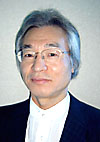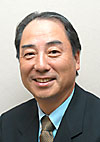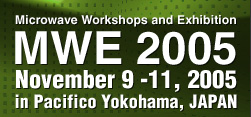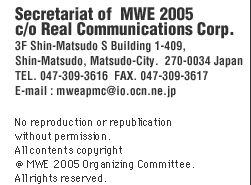| MWE 2005 Opening Ceremony and Keynote Address |
|
| |
| ?Back to List |
| |
| Opening Ceremony |
Nov 09 (Wed). 10:00-10:10 |
RoomF201+F202 |
| Welcome Message from the Steering Committee Chairman |
| Chairman, MWE 2005 Steering Committee : Tadashi Takagi (Tohoku Univ.) |
|
|
|
| Keynote Address |
Nov 09 (Wed). 10:10-12:10 |
RoomF201+F202 |
1. Broadband Mobile Wireless Techniques
Fumiyuki Adachi (Tohoku Univ.) |
| Chair : Tadashi Takagi (Tohoku Univ.) |
|
|
 A very high-speed wireless access of 100Mbps to 1Gbps is required for the 4th generation(4G) mobile communications systems. A promising wireless access technique that can overcome the channel frequency-selectivity and even take advantage of this selectivity to improve the transmission performance is code division multiple access(CDMA). There are two approaches in CDMA technique: direct-sequence(DS) - CDMA and multi-carrier(MC) -CDMA. A lot of attention has been paid to MC-CDMA. However, recently it has been revealed that DS-CDMA can achieve a good performance comparable to MC-CDMA if proper frequency-domain equalization is adopted. A major transmission mode in 4G systems will be packet based. A very high-speed wireless access of 100Mbps to 1Gbps is required for the 4th generation(4G) mobile communications systems. A promising wireless access technique that can overcome the channel frequency-selectivity and even take advantage of this selectivity to improve the transmission performance is code division multiple access(CDMA). There are two approaches in CDMA technique: direct-sequence(DS) - CDMA and multi-carrier(MC) -CDMA. A lot of attention has been paid to MC-CDMA. However, recently it has been revealed that DS-CDMA can achieve a good performance comparable to MC-CDMA if proper frequency-domain equalization is adopted. A major transmission mode in 4G systems will be packet based.
Automatic repeat request(ARQ) combined with channel coding is a very important technique. Furthermore, reducing the mobile terminal transmission powers is an important technical issue.
Fundamental change is necessary in wireless access network architecture. An efficient solution may be an introduction of multi-hop technique. We will discuss about the state of the art of these broadband mobile wireless techniques for 4G systems. |
|
| |
2. Digital Broadcasting and Beyond
Kazumasa Enami (NHK) |
| Chair : Tadashi Takagi (Tohoku Univ.) |
|
|
 In 2000, Digital Satellite Broadcasting began in Japan and Digital Terrestrial broadcasting started in Tokyo, Nagoya and Osaka in 2003, followed by the other areas progressively, resulting in being covered with about 60% of the number of households at the end of the year 2005. New broadcasting services which are viewed on a portable receiver and based on a Home Server are to start after the next fiscal year. Digital broadcasting has been establishing "Ubiquitous Society" which means realization of "at anytime", "anywhere" and "with anyone". In 2000, Digital Satellite Broadcasting began in Japan and Digital Terrestrial broadcasting started in Tokyo, Nagoya and Osaka in 2003, followed by the other areas progressively, resulting in being covered with about 60% of the number of households at the end of the year 2005. New broadcasting services which are viewed on a portable receiver and based on a Home Server are to start after the next fiscal year. Digital broadcasting has been establishing "Ubiquitous Society" which means realization of "at anytime", "anywhere" and "with anyone".
On the other hand, broadcasting services using broadband network has been popularized. The present situation surrounding the digital broadcasting and its future will be discussed in this presentation. |
|




